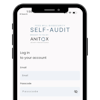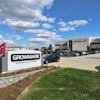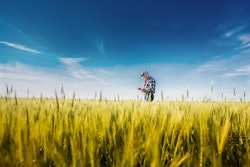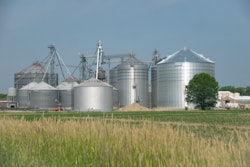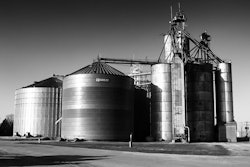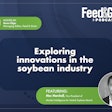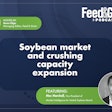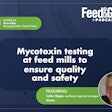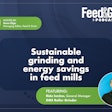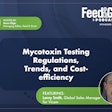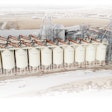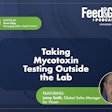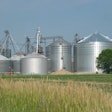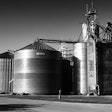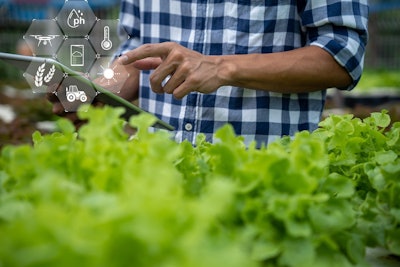
Steven Kilger, the host of theFeed & Grain Podcast, interviewsJake Joraanstad, CEO and cofounder atBushel, which has launched new features on its Bushel Farm app to help producers with marketing, organization and grain contract management.
The app aims to digitize the grain supply chain, starting with grain elevators, co-ops, retailers, ethanol plants and mills that do business with farmers.
Bushel Farm offers tools for farmers to set up their fields, track activities, and access important data like rainfall and growing degree days. Additionally, the app provides a crop marketing and revenue module, allowing farmers to analyze their farm and crop profitability.
The interview emphasizes the significance of automation in reducing manual data entry and making informed decisions for both farmers and grain originators. The integration between Bushel's various tools aims to improve convenience and efficiency in the grain industry.
The interview also touches on a recent conference called "BushelBuddy Seat," where industry professionals and potential customers gathered to discuss the future of agriculture and digitization.
Steven Kilger:Hello, everyone. Welcome to the Feed & Grain Podcast, and thank you for listening. My name is Steven Kilger, managing editor for Feed & Grain and your host.
We have a great show today. We'll be talking to Jake Joraanstad, CEO and cofounder at Bushel. Bushel has just launchednew features on its Bushel Farm appthat will help producers with marketing, organization and grain contract management. We talk about these features and how grain originators will need to adopt digital systems like these to meet future expectations from producers.
Before we get into the conversation, if you're listening to this in a podcast app, subscribe and leave us a review if able. If you're listening to this online, make sure you're subscribed to our newsletter industry watch the latest episodes.
Thank you again for listening. On to the conversation with Jake.
Why don't we just start, Jake, with you? Tell me about yourself.
Jake Joraanstad:My name is Jake Joraanstad. I am our CEO here at Bushel. Also, one of the cofounders and have been on the team from the very beginning of the earliest idea of building software together as a company and then focusing in on agriculture and the grain supply chain if you want to think about it more broadly.
I live in Fargo, North Dakota, and I graduated from NDSU and a pure engineering degree that I don't use on a day-to-day basis, but I have a lot of smart people around me, so that makes up for it.
Kilger:Your announcement is about Bushel Farm, but can you tell me about what Bushel Farm is? I really liked your website and began going through it, and I've noticed that a lot of it is your messages to grain originators. It's not necessarily to producers on your website. Is this a tool that guys can use to help your customers? Can you explain to me about what it is and wanting to do for originators and, of course, producers?
Joraanstad:As a company, our main goal is to build software that helps better digitize the grain supply chain.That starts with the middle of the supply chain, the grain elevator, the co-ops, the retailers, the ethanol plants and mills around the country, that are doing business with the farmers.
Mostfarmers are familiar with a Bushel-powered tool from us, maybe through their local co-op's brand. You'll see maybe a Bushel logo in the tool that you log in to check things like CL tickets and contracts, invoices and prepays and things you're doing on the purchasing side for crop inputs, and, of course, pricing in futures. If you're really good along the way with Bushel, you're also being able to do grain offers and sign contracts and such.
That’s been the core go-to-market tool for Bushel. We call that the Bushel mobile tool on the web portal. What we're talking about today is Bushel Farm. This is quite a bit different than that, in that most of our tools are targeted toward the grain originators, the merchandiser, etc.
With this tool, Bushel Farm, farmers can get this directly by going onto bushelfarm.com for a free 30-day trial. Then they pick a plan, depending on how big their farm is. Generally speaking, anybody under 10,000 acres, you've got a few options, a $300-, $600- or $2,000-a-year option to use this tool.
It starts with things like setting up your fields and doing activity tracking. You can do things by the dates, you can connect your John Deere or Climate Field View tool so that automatically appears on your field and see those records as you go throughout the year. As you get into it, you'll realize, "Oh, Bushel Farm also shows you your rainfall for that field throughout the year," and it's certainly over 98% accurate. You don't have to have a physical device on the field.
That's the foundation for Bushel Farm. As you dig deeper, you'll learn that we've got things like a crop marketing and revenue module. As you can see here, costing against your whole farm and against your crop and against your field. You can get a profits/loss statement of what your operation looks like. That’s been the Bushel Farm tool as it's evolved over the years and originally started off as a company called Farm Logs that we acquired in 2021. That's Bushel Farm today.
Kilger:Excellent. Here’s the crux of things – Bushel has thisbig announcement coming. When we're recording this, it'll be tomorrow. What's the announcement? What do you guys have going on with Bushel Farm?
Joraanstad:One of the things if you're a user of one of our Bushel Power tools at your local facility, you'll probably know that it seems obvious that information you're getting should be connected to a tool if Bushel also has this other tool, which a farm.
One of the first things we wanted to do was think about what are some of the things we can automate for the farmer in Bushel Farm. If we don't automate data entry for the farmer, you might as well be on the spreadsheet, and a lot of farmers are. Although our tool may look fancy, and you could do it on your mobile phone, you could do it on the web. It's, that's great. But if it's all manual entry anyway, why would you pay for it if you're going to be able to do the same thing on a spreadsheet?
I mentioned that integration to the machine data from your farm, so you could do John Deere and your Climate Field View – there could be more to come there. That's cool and that’s helpful because now you're not double entering operations data or whatever it is.
Bushel has a lot of information in our network about your revenue, about your expenses, even when you're purchasing from our facilities. What this new contract integration does is lets a farmer connect – for the first time – their Bushel facilities to their farm account.
This little button appears in the tool and it says, "Hey, connect with Bushel.” You click that button, type in your phone number, as you'll you would do anywhere else in the Bushel world, and we send you a text code to verify it's you. Then a screen appears, and you can automatically import, now and into the future, all of your historical contracts from all the facilities that you do business with Bushel.
Instead of typing in every grant contract manually and trying to get an idea what your revenue is for the three-point crop this year, they just show up automatically. Our price, and whatever changes are happening throughout the year, happens automatically for the farmer.
Now you've got a sense of your expenses with your machine data tied together with price per acre and your revenue. Neither of those things requires you to put a bunch of information in manually. We think that's pretty magical for the farmer.
Kilger:It sounds like it'd be pretty magical for the grain elevator and grain originator, too. That's a lot of little bits of time, right? You have people calling up needing contract information sent to them, needing you to fax it. It wouldn't surprise me if people are still using fax.
Joraanstad:它发生。对于农业方面, today, they're probably using the Bushel Power tool that's branded for them to their farmer. We want to keep that tool as a really powerful way for them to do business with their farmer. What happens is, the farmer has to see their whole position somewhere, to be able to have an intelligent conversation with the merchandiser about what price they should be selling their grain at, etc.
Bushel Farm is the place that we believe is a sufficient line drawn between the customer and the farmer. That’s the farmer's operation and their data and, of course, they're not going to share all that information with everybody. But if they can tell you today, "Hey, my break-even is this. My goal is to get $4.50 per bushel, and I know I can get $5 today."
I can make an intelligent decision, an informed decision, and I didn't have to go do the math because Bushel Farm's doing the math for me. We have really awesome notifications that will say, "Hey, the market just moved 20 cents today. If you sold today, it would mean this profit per acre.”
We can literally tell you that in a notification and give you an idea of the decisions you might want to make today as a farmer. We all know forward marketing of your crop is always a challenge, so our goal is to make that at least more informed so you can make better decisions along the way.
Kilger:It always seems that's the big struggle between a grain originator and a producer is the merchandising. It's always the marketing. It's always what to buy at what's going to be a good price for them. Being able to visualize what that 20-cent increase means seems like a really useful tool. It's everyone's goal for producers, for farmers, to be successful. If they don't exist anymore, we don't exist anymore.
Joraanstad:We know we want that. If you zoom out, there's been three pretty significant events in the last 20 years for farmers on the operation side. One was autosteer and the GPS on the tractor. That's a big deal. We all knew that was like a revelation. It just changed how detailed we were going to be and how much involvement was going to take. And every farmer says I love my autosteer, right?
The next thing that happened was we went from the sort of tractors with no electronics to ones that had their own displays. At first, it was USBs. Maybe you still have to plug in your USB sometimes, but now connected machines where your iPad pulls down all the data on the machine. That's what we use on the farm to connect to that machine data. That was a big revelation because now you have your records. It's a little bit easier to do things like crop insurance reporting, etc.
We think automating your Bushel network data, your contracts and your tickets are going to be next, then your invoices on the expense side, which all appear in one account. It’s a huge jump.
Today, you are double entering that information everywhere, or you're just doing it by paper and getting reports. If you can get this information into your system in one place, alongside all the other operational data for your farm, that's just a meaningful change in how you think about your operation.
If you're not on the Bushel network as a facility, though, then your farmer is going to still have to manually enter all your work. Part of this deal is, hey if you're on the Bushel network, there's an advantage to farmers you work with. Therefore, you have an advantage in the market in terms of making it easy to do business with. Everybody wants to be easier to do business with because, in the end, we all make a lot of decisions based on convenience. Bushel’s job is to make it more convenient to work with your farmer. This is just one of those ways.
Kilger:The automation makes it so much more accessible. A lot of the hurdle to entry for these kinds of programs is having to do double entry, yet they don't quite link up. It seems like a big advantage.
How many subscribers do you have now with Bushel? Over half a million, something like that? It's becoming more and more common to have a system like this, so if grain elevators aren't invested in this, are they starting to fall behind? It's getting to the point where it's no longer acceptable to just have the old spreadsheet and the paper and stuff stuck to a bulletin board. All your contracts are there and the paper on the table. Well, that not becoming. It's not going to be the future. It’s really cool that you guys are now merging this entire ecosystem together.
Joraanstad:Over time, you can imagine all the things that will be connected there in one place, just make your life a little bit easier.
Kilger:Anything else happening with the announcement we didn't mention?
Joraanstad:We've got more announcements to come here in the next couple of months, probably a bit of a busy couple of months for a Bushel in terms of PR and such. But right now, the focus is, "Hey, if you're, if you're using the virtual farm, this is going to be obvious to you."
将会有一条如果你是一个免费商业模式er today. If you want to keep that package going, you can connect, and we'll make it easier to do that. We continue to mess with prices. There’s actually a more affordable package than we've had before. There's also a more expensive package that has more of these capabilities. Farmers that are looking into this, they'll see that on the page bushelpowered.com.
Kilger:A little side note, how did your event go? What was that last month in Fargo? We're making it next year. Someone from Feed & Grain is coming up next year.
Joraanstad:Bushel Buddy Seat was the conference name. Most people in this conversation know what a buddy seat is, but that's what we called our customer conference this year. Almost 200 people were at the conference. Downtown Fargo in the summer is one of the best places to be everything from great restaurants to great speakers and all kinds of fun events. We threw a big shindig party in between our event and cultivated the next day withEmergingPrairie. A lot of positive energy. We had a lot of partners and potential customers here. We'd love to have you all join next year. If anything, it's a good place to connect with a lot of people in this space that are forward-thinking and trying to figure out what's coming next. And it was really fun.
Kilger:It looked like it. I watched your preview video back in January. That sounds fun, and I encourage everyone else to check it out too. Thank you again for talking to me today. I really appreciate it.
Joraanstad:Steven, I appreciate you spending the time with us. It's always fun to have a good conversation with somebody who knows the space well. We’re looking forward to hearing feedback from your audience.
Kilger:I will get this industry to go completely digital and completely automated if I have to drag them kicking and screaming.
Joraanstad:A lot of collaboration to be had yet. There's never going to be just one winne, but there's a lot of progress being made. We should be excited about that.
Kilger:Like I said, automation, that'll save our industry right now from labor shortages and everything else. It will be what keeps us going.
Joraanstad:One last point, I had an opportunity last week, Steven, to share in TEDx Fargo as one of the speakers this year. Almost 2000 people attended the event. It's pretty crazy. I chose, of course, to talk about the oldest industry on Earth, agriculture and the opportunity to participate in changing the way that digitization happens here, and it being dead last in terms of digitization, as an opportunity.
I was hopeful that I inspired other folks to join in the cause of helping make agriculture work in the next 100 years. On the next hand, the technology, we've got all this labor shortage in the U.S., it's not going to change, you can't bring enough people into a small town to really make that work. We need to use technology to do a better job of serving those communities. That was my mission, my message and my ask for the crowd -- what can you do to help? If you're a technologist and you're looking to change the world and make a positive impact, agriculture is the best place and the most important industry on Earth. So let's go do it.
Kilger:And a good steady paycheck for the rest of your career, too, because it's always going to be around. Thank you, guys, again, so much for talking to me.
Joraanstad:Thank you Steven.

.jpg?auto=format%2Ccompress&crop=faces&fit=crop&h=48&q=70&w=48)


